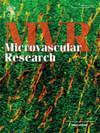2型糖尿病或肥胖症住院教育项目中甲襞毛细血管的定量图像分析
IF 2.7
4区 医学
Q2 PERIPHERAL VASCULAR DISEASE
引用次数: 0
摘要
甲襞毛细血管是位于指甲近端皮肤下的小u形血管,其形态会因各种疾病而改变。本研究利用显微镜定量分析了住院2周接受教育和治疗的2型糖尿病(T2D)或肥胖患者的甲襞毛细血管。我们的结果表明甲襞动脉直径和吸烟史是糖尿病神经病变的有用预测因子。住院期间尿白蛋白/肌酐比值升高与静脉直径减小相关,反映了糖尿病肾病患者潜在的血管内低白蛋白血症。体重指数和住院期间的短期体重减轻与毛细血管和血管周围区之间的颜色对比相关,定义为delta E。这些结果表明,T2D和肥胖患者的甲襞毛细血管形态可能是糖尿病神经病变和肾病的有用指标,而delta E是这些人群细胞外水量的有用指标。这是第一个观察与生活方式相关疾病干预有关的甲襞毛细血管形态短期变化的研究。本文章由计算机程序翻译,如有差异,请以英文原文为准。
Quantitative image analysis of nailfold capillaries during an in-hospital education program for type 2 diabetes or obesity
Nailfold capillaries are small U-shaped vessels located beneath the skin at the proximal part of the fingernail, and their morphology changes owing to various diseases. This study quantitatively analyzed nailfold capillaries using microscopy in patients hospitalized for 2 weeks for education and treatment of type 2 diabetes (T2D) or obesity. Our results suggest that nailfold arterial diameter and smoking history are useful predictors of diabetic neuropathy. An elevated urinary albumin-to-creatinine ratio correlated with decreased venous diameter during hospitalization, reflecting latent intravascular hypoalbuminemia in patients with diabetic nephropathy. Both body mass index and short-term weight reduction during hospitalization correlated with the color contrast between the capillaries and the perivascular zone, defined as delta E. These results suggest that the morphology of nailfold capillaries in T2D and obesity could be useful indicators of diabetic neuropathy and nephropathy, with delta E being a useful indicator of extracellular water volume in these populations. This is the first study to observe short-term changes in nailfold capillary morphology in relation to interventions for lifestyle-related diseases.
求助全文
通过发布文献求助,成功后即可免费获取论文全文。
去求助
来源期刊

Microvascular research
医学-外周血管病
CiteScore
6.00
自引率
3.20%
发文量
158
审稿时长
43 days
期刊介绍:
Microvascular Research is dedicated to the dissemination of fundamental information related to the microvascular field. Full-length articles presenting the results of original research and brief communications are featured.
Research Areas include:
• Angiogenesis
• Biochemistry
• Bioengineering
• Biomathematics
• Biophysics
• Cancer
• Circulatory homeostasis
• Comparative physiology
• Drug delivery
• Neuropharmacology
• Microvascular pathology
• Rheology
• Tissue Engineering.
 求助内容:
求助内容: 应助结果提醒方式:
应助结果提醒方式:


